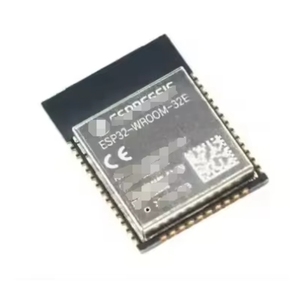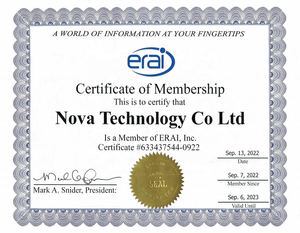
All categories
Featured selections
Trade Assurance
Buyer Central
Help Center
Get the app
Become a supplier

(824 products available)
















































NodeMCU ESP8266 is available in various models, each designed to meet specific requirements and user needs. The main differences between the versions include variations in the number of GPIOs, PWM-supported GPIOs, and analog input features.
The ESP-12E and ESP-12F are the most widely used modules in this lineup, offering 11 GPIOs and 1 analog input pin. They are suitable for projects requiring moderate I/O capabilities and a decent range of analog sensors. The ESP-07 and ESP-08 models are slightly enhanced over the previous versions; both offer 2 Kbyte Flash and 512 Kbyte RAM. They also support I2S functionality, making them an excellent choice for audio applications. For more advanced projects, the ESP-32 module provides a significantly larger GPIO count and dual-core processing capabilities. It supports more complex real-time operations and sensor integrations. The selection of NodeMCU kits based on the project requirements ensures efficient performance in IoT applications.
Following are some popular types of NodeMCU ESP8266:
The NodeMCU Lua WiFi chip is perfect for everyday applications. Adding WiFi capabilities to everyday tasks makes it easy to control things wirelessly.
It comes with 4 GPIOs, an LED pin, a buzzer, and a temperature sensor, simplifying tasks like turning lights on and off or checking the temperature at home.
The NodeMCU Lua chip uses a program called the Lua Interpreter to automate many small jobs, making life simpler.
The NodeMCU ESP8266 board is an all-in-one tool that integrates WiFi, GPIO, and programmability. It’s like a mini-computer that can connect to the internet and control devices.
With 10 GPIOs, it can manage multiple tasks, like checking sensors and sending data online. This makes it great for projects that require working with several devices or sensors at the same time.
This board uses the ESP8266 WiFi chip, known for its strength and efficiency. It can handle good WiFi connections and is suitable even for remote projects.
The ESP8266 NodeMCU is recommended for users who want to start Internet of Things projects without needing advanced hardware knowledge. It comes with WiFi capabilities, GPIOs, and easy programming options.
It refers to a specific WiFi chip made by Espressif Systems. This chip is famous because it works well for wireless communication in many projects.
The ESP8266 is compact and cost-effective and provides good performance for its size, enabling a wide range of applications, from simple sensor monitoring to complex automation systems.
The NodeMCU ESP8266 is packed with features that amateur and professional enthusiasts might consider essential for creating fascinating IoT projects.
Integrated WiFi Connectivity
One of the standout features of the NodeMCU ESP8266 is its built-in WiFi capability, allowing users to connect to the internet wirelessly. This makes it ideal for remote sensor monitoring, home automation, and other IoT applications.
Lua Scripting
The NodeMCU uses the Lua programming language, simplifying coding for users, especially beginners. The lightweight, event-driven nature of Lua enables quick development and testing of applications.
Cross-Platform Compatibility
NodeMCU can be programmed using the Arduino IDE or custom NodeMCU builds, providing versatility for developers with different preferences.
ESP8266 chip Power
The ESP8266 is a cost-effective WiFi system-on-chip (SoC) that delivers robust performance in various applications. It supports both access point and station modes for flexible networking options.
Rich GPIO Interface
The NodeMCU ESP8266 features multiple GPIO pins, allowing users to connect various sensors, actuators, and other electronic components to build complex systems. The availability of PWM, I2C, and SPI functionalities expand its usability for diverse projects.
Easy Flashing
Flashing new firmware or updating existing programs is straightforward, thanks to its USB interface. This simplifies the development process.
Project Requirements
Understanding the specific needs of each project is fundamental. NodesMCUs are powerful ESP32s, perfect for projects needing strong processing and connections. ESP8266 is simpler but still good for basic tasks like checking sensors and controlling devices.
Scalability
When choosing a NodeMCU, think about future needs. Will the project grow? The selected NodeMCU should allow adding more devices and sensors without many changes. Picking a scalable option now avoids larger adjustments later.
Cost Effectiveness
Budget matters, too. NodeMCUs come in various price ranges. For projects that only need basic tasks, the ESP8266 is a cheaper choice. The more powerful ESP32 might cost more but is worthwhile for bigger projects that need speed and performance.
Community Support
It’s helpful to choose a NodeMCU with strong community help. NodeMCU ESP32s have large online groups and many guides. Finding answers quickly when there’s a problem is important, and a supported chip makes this easier.
Development Speed
NodeMCUs like the ESP8266 and ESP32 are easy to program, which helps finish projects faster. It’s vital to consider how quickly the team can develop and test ideas when picking the right NodeMCU for business needs.
The commercial value of the NodeMCU ESP8266 lies predominantly in electronics, especially in IoT, where demand keeps rising. Its affordable price and versatility let it power many applications, from simple home automations to industrial monitoring systems.
Growing Demand
As more businesses and homes start using connected devices, the need for reliable and cheap IoT solutions grows.
Cost Efficiency
The NodeMCU ESP8266 is one of the most budget-friendly options in the market today. It cuts down costs while keeping WiFi, GPIO, and easy programming.
Diverse Applications
This makes it useful in many areas. Companies can use it for simple tasks like checking temperatures or making things like smart home gadgets that work with apps on phones.
Compatibility
What makes the NodeMCU stand out from other modules like the ESP32 is that developers can use popular coding tools like the Arduino IDE. This helps the team work faster and reduces development time.
Rich Community Support
It has a big online community, and there are many guides, forums, and projects online to help fix problems or get new ideas. This community support speeds up the development process and lowers costs because companies don’t need to spend a lot of time training people or testing things.
Industrial Applications
It’s also used in Industry 4.0 applications for machine monitoring and optimizing workflows.
Easy Integration
Developers like it because it integrates well with cloud services. By combining cloud computing with the NodeMCU, businesses can now easily collect and analyze data from faraway devices.
The NodeMCU ESP8266 uses Lua natively, but it's also widely programmed using the Arduino IDE with C/C++, Python, and MicroPython for more robust applications.
While the NodeMCU ESP8266 is efficient for basic IoT tasks, the ESP32 outperforms it with dual-core processing, Bluetooth support, and greater GPIO availability for complex applications.
Common use cases include smart agriculture, industrial automation, home automation, and remote environmental monitoring due to its wireless connectivity and GPIO capabilities.
Yes, it features power-saving modes, allowing efficient energy consumption for battery-powered devices, making it ideal for remote sensors and portable applications.
Yes, it supports WPA/WPA2 encryption, enabling secure connections to protected Wi-Fi networks, essential for secure data transmission in IoT applications.